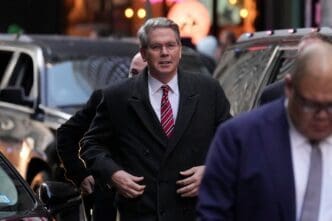WASHINGTON – President-elect Donald Trump’s pick for Treasury secretary, hedge fund manager Scott Bessent, vowed to maintain the dollar’s status as the world’s reserve currency as he prepared to face questions from U.S. senators on Thursday on how he will implement Trump’s tax cut, tariff and deregulation plans.
Bessent’s testimony at a Senate Finance Committee confirmation hearing at 10:30 a.m. EST (1530 GMT) will have financial markets on edge amid worries – reflected in rising bond yields – that Trump’s policy plans could stoke inflation and spark a new global trade war that threatens financial stability.
The 62-year-old founder of Key Square Capital Management will need to present himself as a moderating influence on Trump’s “more extreme” plans, said David Wessel, director of the Brookings Institution’s Hutchins Center on Fiscal and Monetary Policy.
“What the markets and the business community want is to know that there’s a grown-up at the table who doesn’t think that cutting taxes excessively and running up the debt is a good idea,” Wessel said. “And someone who doesn’t think that all of Trump’s tariff campaign promises are good ideas.”
In prepared remarks released on Wednesday night, Bessent laid out a vision for “a new economic golden age” that included prioritizing strategic investments that grow the U.S. economy and making permanent Trump’s 2017 individual and small business tax cuts that are due to expire on Dec. 31, 2025.
“We must secure supply chains that are vulnerable to strategic competitors, and we must carefully deploy sanctions as part of a whole-of-government approach to address our national security requirements,” Bessent also said in the remarks.
“And critically, we must ensure that the U.S. dollar remains the world’s reserve currency.”
TARIFF ADVOCATE
Bessent did not mention China in his prepared remarks, but he has been a strong advocate for Trump’s plans for sweeping tariffs that range between 10% on all imports and 60% on Chinese goods.
In a Fox News opinion piece published a week before he emerged as the winner of a high-drama contest for Trump’s Treasury choice in November, Bessent lauded tariffs as “a means to finally stand up for Americans” after decades of job losses to rising imports.
“Used strategically, tariffs can increase revenue to the Treasury, encourage businesses to restore production and reduce our reliance on industrial production from strategic rivals,” especially China, Bessent wrote.
TAX QUESTIONS
Finance Committee Democrats are expected to hammer Bessent on his plans for extending the 2017 tax cuts for individuals and small businesses that expire at the end of this year. Budget forecasters estimate this would add at least $4 trillion to the federal debt over a decade without savings elsewhere.
Bessent in his remarks called for the Trump administration and Congress to implement “pro-growth policies to reduce the tax burden on American manufacturers service workers and seniors.”
The latter policies refer to Trump’s campaign promises to lower the corporate tax rate to 15% from 21% for companies manufacturing products in the United States, and to exempt income from tips and Social Security from taxation.
Senate Finance Committee Democrat Elizabeth Warren released a list of 180 questions for Bessent to answer, including some challenging his past assertions that tax cuts could pay for themselves by generating higher growth.
“Your expertise has been in making already-rich investors even richer, not cutting costs for families or making the economy stronger for all Americans,” Warren wrote in her letter to Bessent.
The Senate panel’s Republican chairman, Mike Crapo, called Bessent “one of the sharpest minds in the global finance industry.”
Crapo added in his own prepared remarks that Bessent would “have to work with Congress to preserve and build on pro-growth Republican tax policies that have greatly benefited all Americans.”
FED INDEPENDENCE QUESTIONS
Bessent grew up in South Carolina and went to Yale University before starting work on Wall Street, where he helped famed investor George Soros earn over $1 billion by betting against the British pound in 1992.
He started Key Square in 2015, quickly raising $4.5 billion in assets, which peaked at $5.1 billion at the end of 2017 but dropped to $477 million six years later. Bessent has pledged to divest his Key Square investments to avoid conflicts of interest.
Markets also will parse Bessent’s comments on Federal Reserve independence, given his past advocacy of appointing a “shadow” chair to the Fed board who would offer alternative policy guidance. Trump has recently complained about interest rates being too high, despite three Fed cuts last year.








